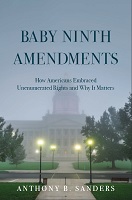Baby Ninth Amendments
External Review of Whole Manuscript
How Americans Embraced Unenumerated Rights and Why It Matters
| dc.contributor.author | Sanders, Anthony B | |
| dc.date.accessioned | 2023-05-09T08:58:23Z | |
| dc.date.available | 2023-05-09T08:58:23Z | |
| dc.date.issued | 2023 | |
| dc.identifier.uri | https://library.oapen.org/handle/20.500.12657/62924 | |
| dc.description.abstract | Listing every right that a constitution should protect is hard. American constitution drafters often list a few famous rights such as freedom of speech, protection against unreasonable searches and seizures, and free exercise of religion, plus a handful of others. However, we do not need to enumerate every liberty because there is another way to protect them: an ""etcetera clause."" It states that there are other rights beyond those specifically listed: ""The enumeration in the Constitution, of certain rights, shall not be construed to deny or disparage others retained by the people."" Yet scholars are divided on whether the Ninth Amendment itself actually does protect unenumerated rights, and the Supreme Court has almost entirely ignored it. Regardless of what the Ninth Amendment means, two-thirds of state constitutions have equivalent provisions, or ""Baby Ninth Amendments,"" worded similarly to the Ninth Amendment. This book is the story of how the ""Baby Ninths"" came to be and what they mean. Unlike the controversy surrounding the Ninth Amendment, the meaning of the Baby Ninths is straightforward: they protect individual rights that are not otherwise enumerated. They are an ""etcetera, etcetera"" at the end of a bill of rights. This book argues that state judges should do their duty and live up to their own constitutions to protect the rights ""retained by the people"" that these ""etcetera clauses"" are designed to guarantee. The fact that Americans have adopted these provisions so many times in so many states demonstrates that unenumerated rights are not only protected by state constitutions, but that they are popular. Unenumerated rights are not a weird exception to American constitutional law. They are at the center of it. We should start treating constitutions accordingly. | en_US |
| dc.language | English | en_US |
| dc.subject.classification | thema EDItEUR::J Society and Social Sciences::JP Politics and government | en_US |
| dc.subject.classification | thema EDItEUR::J Society and Social Sciences::JP Politics and government::JPR Regional, state and other local government | en_US |
| dc.subject.classification | thema EDItEUR::J Society and Social Sciences::JP Politics and government::JPH Political structure and processes::JPHC Constitution: government and the state | en_US |
| dc.subject.classification | thema EDItEUR::L Law::LN Laws of specific jurisdictions and specific areas of law::LND Constitutional and administrative law: general | en_US |
| dc.subject.classification | thema EDItEUR::L Law::LN Laws of specific jurisdictions and specific areas of law::LND Constitutional and administrative law: general::LNDU Local government law | en_US |
| dc.subject.other | Baby Ninth Amendments, state constitutions, Lockean rights, Baby Tenths, unenumerated rights, constitutional conventions, economic liberty, Ninth Amendment, judicial review, judicial engagement, originalism, American history, rational basis, judicial scrutiny, Alabama Constitution, Maine Constitution, Reconstruction, Civil War, Lochner era, collective rights, individual rights, state constitutional law, Constitution, legal history, bill of rights | en_US |
| dc.title | Baby Ninth Amendments | en_US |
| dc.title.alternative | How Americans Embraced Unenumerated Rights and Why It Matters | en_US |
| dc.type | book | |
| oapen.identifier.doi | 10.3998/mpub.12676756 | en_US |
| oapen.relation.isPublishedBy | e07ce9b5-7a46-4096-8f0c-bc1920e3d889 | en_US |
| oapen.relation.isFundedBy | 80ae82ea-d4e5-417e-b692-fd82b7fe1941 | en_US |
| oapen.relation.isbn | 9780472076154 | en_US |
| oapen.relation.isbn | 9780472056156 | en_US |
| oapen.pages | 215 | en_US |
| peerreview.anonymity | Double-anonymised | |
| peerreview.id | d98bf225-990a-4ac4-acf4-fd7bf0dfb00c | |
| peerreview.open.review | No | |
| peerreview.publish.responsibility | Scientific or Editorial Board | |
| peerreview.review.decision | Yes | |
| peerreview.review.stage | Pre-publication | |
| peerreview.review.type | Full text | |
| peerreview.reviewer.type | External peer reviewer | |
| peerreview.title | External Review of Whole Manuscript | |
| oapen.review.comments | The proposal was selected by the acquisitions editor who invited a full manuscript. The full manuscript was reviewed by two external readers using a double-blind process. Based on the acquisitions editor recommendation, the external reviews, and their own analysis, the Executive Committee (Editorial Board) of U-M Press approved the project for publication. |

